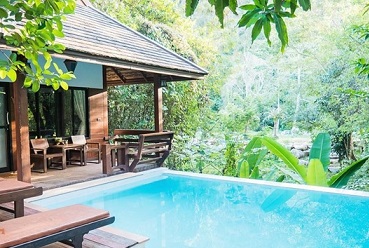 INTERNATIONAL REPORT—The hospitality industry has changed a lot over time and continues to transform as it adapts to the ongoing shifts in consumer behavior. As the sector is still recovering from the pandemic, it is more important than ever to meet and satisfy travelers’ needs and requirements, and it appears that what people want right now is more green accommodations.
INTERNATIONAL REPORT—The hospitality industry has changed a lot over time and continues to transform as it adapts to the ongoing shifts in consumer behavior. As the sector is still recovering from the pandemic, it is more important than ever to meet and satisfy travelers’ needs and requirements, and it appears that what people want right now is more green accommodations.
Sustainability has become the biggest driver of change in the sector in recent years, as people have become more mindful of the impact they have on the environment and that also reflects in their travel habits. Travelers are starting to look beyond location, amenities and price point when planning their trips, prioritizing educational tourism and doing their best to lower their carbon footprint while traveling. As a result, an increasing number of hotels have started implementing sustainability practices and even setting ambitious net-zero goals to make their services more appealing to eco-conscious consumers.
Big hotel chains such as Marriot, Hilton, Hyatt and IHG have already taken important steps in this direction by ramping up their sustainability efforts. Marriott, which operates 6,200 properties in 125 countries and territories, has announced a multifaceted sustainability strategy, comprising a range of measures from cutting food waste in half to switching to responsible sourcing of 90 percent of their top priority categories by 2025.
Hilton has similar plans in place, aiming to reduce carbon emissions by 61 percent, reduce water consumption and waste by 50 percent, eliminate plastic straws on all its properties, and purchase meat, poultry, produce, seafood and cotton only from sustainable sources, all by 2030. Hilton is also the first major hotel chain to institute science-based targets for sending zero soap to landfill.
Hyatt Hotels are not far behind in the sustainability race, as it plans to reduce water use per guest night by 30 percent in water-stressed locations and by 25 percent in the rest of its properties. In addition, the company also takes part in the Clean the World hotel recycling program and has struck a partnership with the World Wildlife Federation to source their seafood from responsibly managed fisheries and seafood farms.
As a large percentage of the hospitality industry is jumping onboard the environmental protection movement, there are a few key trends that most hotel brands target in order to achieve their goals. These include:
- Reducing food waste;
- Reducing water consumption by using innovative solutions such as shower filters or encouraging guests to be more mindful of their water usage;
- Eliminating single-use plastic products on hotel premises;
- Implementing renewable energy technology to generate electricity;
- Installing energy-saving appliances; and
- Using biodegradable cleaning products.
Reducing Your Hotel’s Environmental Impact
Apart from the examples we’ve mentioned above, there are many other hotel chains that have embraced a similar approach by prioritizing sustainable practices or committing to going carbon neutral.
The fact remains that tourists expect all hotels, regardless of their size or location, to get actively involved in environmental protection as well, and one would be reckless to ignore customers’ demands. Fortunately, there are several things that smaller hotels can do to reduce their impact on the environment.
One can’t take action without knowing what exactly you’re dealing with. Therefore, the first step towards making your hotel eco-friendlier would be to conduct a thorough sustainability audit. This will help you assess the current sustainability level of your establishment and identify the areas that you need to improve in the future. There are two ways you can go about conducting a sustainability audit for your hotel. You can track different metrics such as waste generation, water usage, or energy consumption on your own, and measure the impact of the sustainability measures you already have in place. Alternatively, you can outsource this task to an audit support service provider.
Water consumption is an important point of interest on hotels’ sustainability agenda, but also a very sensitive issue to tackle. The best way to reduce water usage in a hotel is to encourage guests to use less water during their stay. However, since you can’t impose mindful water consumption habits on clients, the next best thing is to install water-saving fixtures throughout the hotel such as touchless faucets, pressure-reducing valves, or low-flow showerheads.
Since most hotels use massive amounts of energy to run their operations, energy conservation should also be high on your priority list. Small but practical changes such as opting for LED light bulbs, installing smart thermostats and occupancy sensors, or insulating the building can make a big difference in the long run.
Let’s not forget about waste reduction and recycling. Reducing the amount of waste that your hotel generates can be a challenging task, but you can take things one step at a time. Once again, even the smallest actions can have a huge impact in this respect. Replacing single-use items with reusable ones, composting food waste or installing recycling bins in your hotel represent a good starting point.
Last but not least, you should also strive to educate guests on hotel sustainability by providing information on how they can support your green practices. Since there’s a wealth of readily available information and initiatives such as the Jerusalem carbon offset program for traveling to Israel that are meant to make tourism more sustainable, you can also encourage guests to check out different resources on the topic so they can expand their knowledge in this area and enhance their eco-friendly contribution.
In the end, we have to acknowledge the fact that sustainability is no longer an option in the hospitality industry but rather a requirement. So, whether you’re running a boutique hotel or an exclusive luxury resort, sustainability seems to be the only way forward in this highly competitive sector.







